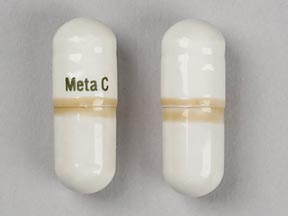Metamucil Plus Calcium Disease Interactions
There are 9 disease interactions with Metamucil Plus Calcium (calcium carbonate / psyllium).
- Intestinal obstruction
- Phosphate calcifications
- Cardiac contraction/conduction
- Malabsorption
- Renal dysfunction
- Sarcoidosis
- Inflammatory bowel disease
- Intestinal obstruction disorders
- Renal dysfunction
Bulk producing laxatives (applies to Metamucil Plus Calcium) intestinal obstruction
Major Potential Hazard, High plausibility. Applicable conditions: Gastrointestinal Obstruction
The use of bulk producing laxatives is contraindicated in patients with intestinal obstruction or fecal impaction. Bulk producing laxatives can exacerbate these conditions.
Calcium salts (applies to Metamucil Plus Calcium) calcium- phosphate calcifications
Major Potential Hazard, High plausibility. Applicable conditions: Phosphate Imbalance
Elevated serum concentrations of calcium and phosphate can exceed the solubility level and result in calcium- phosphate precipitates that deposit in vascular and renal systems as well as other soft tissues of the body. Therapy with calcium should be administered with extreme caution in patients with hyperphosphatemia (hypoparathyroidism or severe renal impairment). Administration of oral calcium acetate or calcium carbonate, in addition to providing calcium, complexes phosphates within the GI tract. These complexes are eliminated in the feces. Clinical monitoring of serum calcium and phosphate concentrations is necessary.
Calcium salts (applies to Metamucil Plus Calcium) cardiac contraction/conduction
Major Potential Hazard, High plausibility. Applicable conditions: Arrhythmias
Calcium is involved in cardiac muscle contraction and electrical impulse conduction. Therapy with calcium salt formulations (particularly IV) should be administered cautiously to patients with cardiac disease. Patients receiving cardiac glycosides and concomitant IV calcium may experience arrhythmias. Therapy with IV calcium should be administered slowly and at reduced dosages in patients with cardiac disease.
Calcium salts (applies to Metamucil Plus Calcium) malabsorption
Major Potential Hazard, High plausibility. Applicable conditions: Achlorhydria, Malabsorption Syndrome
Calcium is absorbed from the intestinal tract by active transport and passive diffusion. Malabsorption syndromes (celiac disease, GI resection), deficiency of vitamin D, parathyroid hormone, or calcitonin, or an alkaline gastric pH (achlorhydria, carbonate or phosphate salts) can decrease the absorption of oral formulations of calcium. Calcium is available in oral and parenteral formulations.
Calcium salts (applies to Metamucil Plus Calcium) renal dysfunction
Major Potential Hazard, High plausibility.
Absorption of oral calcium formulations may be altered and elimination of calcium by the kidney decreased with renal impairment. Hyperphosphatemia occurs during renal failure. Calcium acetate or calcium carbonate, in addition to providing calcium, complexes phosphates within the GI tract. Calcium carbonate can partially correct metabolic acidosis associated with chronic renal failure. Clinical monitoring of renal function and serum calcium and phosphate concentrations is necessary.
Calcium salts (applies to Metamucil Plus Calcium) sarcoidosis
Major Potential Hazard, High plausibility.
Hypercalciuria, with or without hypercalcemia, may occasionally occur in patients with sarcoidosis. Elevated calcium levels may result from increased intestinal absorption of calcium, which is related to the extrarenal production of vitamin D by mononuclear phagocytes present within the sarcoid granuloma. Therapy with calcium salts should be administered cautiously and only if necessary in patients with sarcoidosis.
Laxatives (applies to Metamucil Plus Calcium) inflammatory bowel disease
Major Potential Hazard, Moderate plausibility.
The use of laxatives is contraindicated in patients with inflammatory bowel disease. Patients with inflammatory bowel disease may experience colonic perforation with use of stimulant laxatives.
Laxatives (applies to Metamucil Plus Calcium) intestinal obstruction disorders
Major Potential Hazard, Moderate plausibility. Applicable conditions: Gastrointestinal Obstruction
The use of laxatives is contraindicated in patients with intestinal obstruction disorders. Patients with intestinal obstruction disorders may need their underlying condition treated to correct the constipation. Some laxatives require reduction in the colon to their active form to be effective which may be a problem in patients with intestinal obstruction.
Bulk producing laxatives (applies to Metamucil Plus Calcium) renal dysfunction
Moderate Potential Hazard, High plausibility.
Bulk producing laxatives require the consumption of at least 8 ounces of fluid per each dose. Patients with fluid restriction conditions such as renal dysfunction may benefit more from emollient or stimulant laxatives.
Switch to professional interaction data
Metamucil Plus Calcium drug interactions
There are 243 drug interactions with Metamucil Plus Calcium (calcium carbonate / psyllium).
Metamucil Plus Calcium alcohol/food interactions
There are 2 alcohol/food interactions with Metamucil Plus Calcium (calcium carbonate / psyllium).
Drug Interaction Classification
| Highly clinically significant. Avoid combinations; the risk of the interaction outweighs the benefit. | |
| Moderately clinically significant. Usually avoid combinations; use it only under special circumstances. | |
| Minimally clinically significant. Minimize risk; assess risk and consider an alternative drug, take steps to circumvent the interaction risk and/or institute a monitoring plan. | |
| No interaction information available. |
Further information
Always consult your healthcare provider to ensure the information displayed on this page applies to your personal circumstances.


